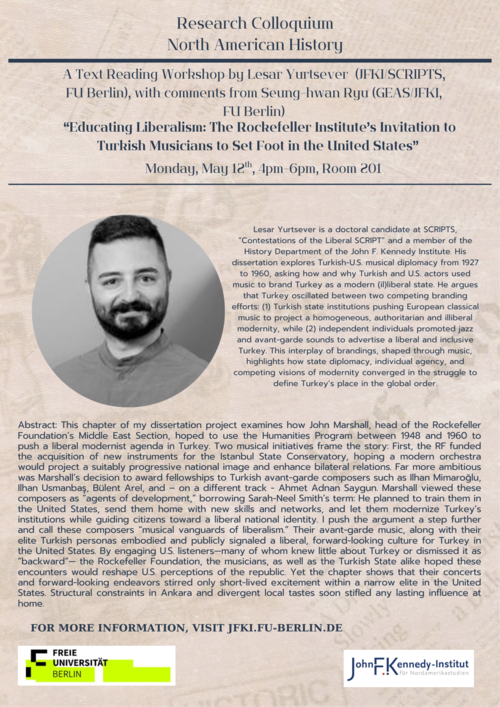Research Colloquium: Text Reading Workshop “Educating Liberalism: The Rockefeller Institute’s Invitation to Turkish Musicians to Set Foot in the United States” presented by Lesar Yurtsever
Lesar Yurtsever is a doctoral candidate at SCRIPTS, “Contestations of the Liberal SCRIPT” and a member of the History Department of the John F. Kennedy Institute. His dissertation explores Turkish-U.S. musical diplomacy from 1927 to 1960, asking how and why Turkish and U.S. actors used music to brand Turkey as a modern (il)liberal state. He argues that Turkey oscillated between two competing branding efforts: (1) Turkish state institutions pushing European classical music to project a homogeneous, authoritarian and illiberal modernity, while (2) independent individuals promoted jazz and avant-garde sounds to advertise a liberal and inclusive Turkey. This interplay of brandings, shaped through music, highlights how state diplomacy, individual agency, and competing visions of modernity converged in the struggle to define Turkey’s place in the global order.
Abstract: This chapter of my dissertation project examines how John Marshall, head of the Rockefeller Foundation’s Middle East Section, hoped to use the Humanities Program between 1948 and 1960 to push a liberal modernist agenda in Turkey. Two musical initiatives frame the story: First, the RF funded the acquisition of new instruments for the Istanbul State Conservatory, hoping a modern orchestra would project a suitably progressive national image and enhance bilateral relations. Far more ambitious was Marshall’s decision to award fellowships to Turkish avant-garde composers such as Ilhan Mimaroğlu, Ilhan Usmanbaş, Bülent Arel, and – on a different track - Ahmet Adnan Saygun. Marshall viewed these composers as “agents of development,” borrowing Sarah-Neel Smith’s term: He planned to train them in the United States, send them home with new skills and networks, and let them modernize Turkey’s institutions while guiding citizens toward a liberal national identity. I push the argument a step further and call these composers “musical vanguards of liberalism.” Their avant-garde music, along with their elite Turkish personas embodied and publicly signaled a liberal, forward-looking culture for Turkey in the United States. By engaging U.S. listeners—many of whom knew little about Turkey or dismissed it as “backward”— the Rockefeller Foundation, the musicians, as well as the Turkish State alike hoped these encounters would reshape U.S. perceptions of the republic. Yet the chapter shows that their concerts and forward-looking endeavors stirred only short-lived excitement within a narrow elite in the United States. Structural constraints in Ankara and divergent local tastes soon stifled any lasting influence at home.

